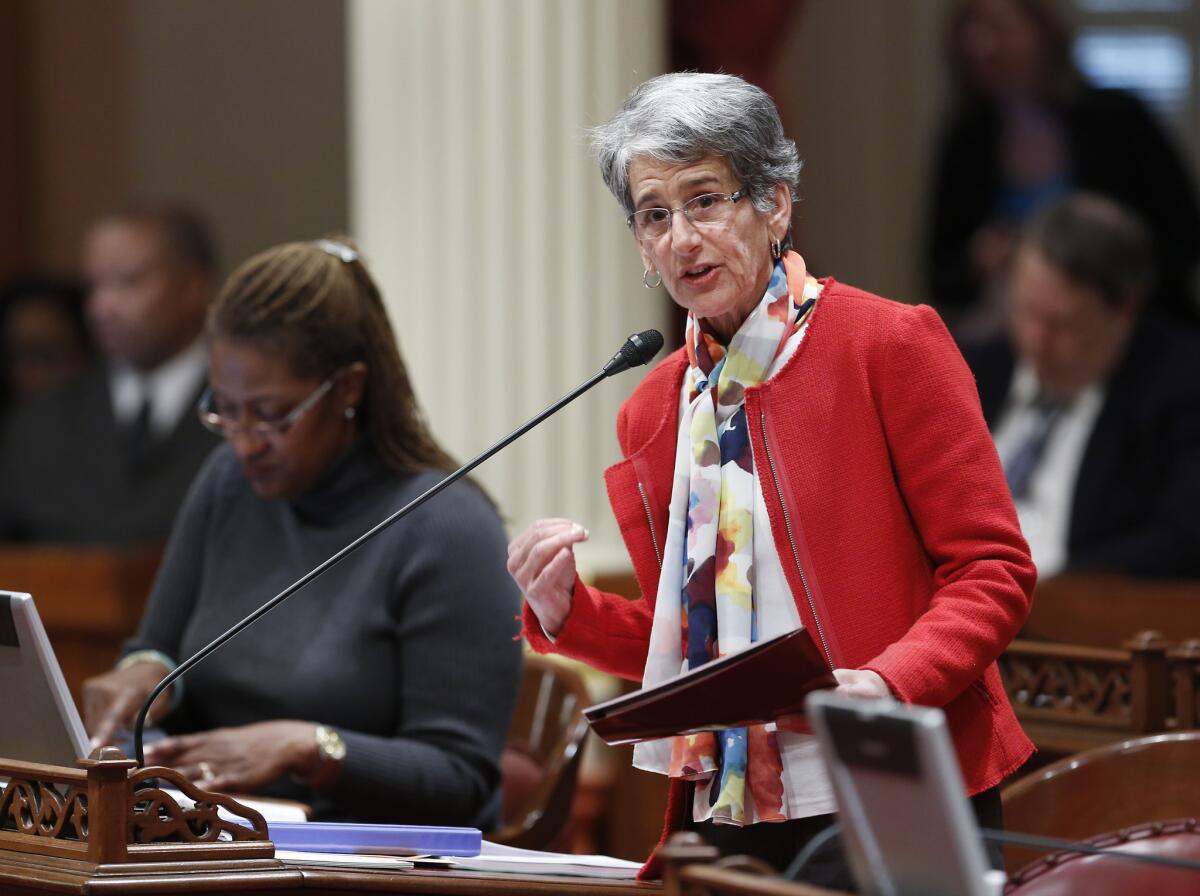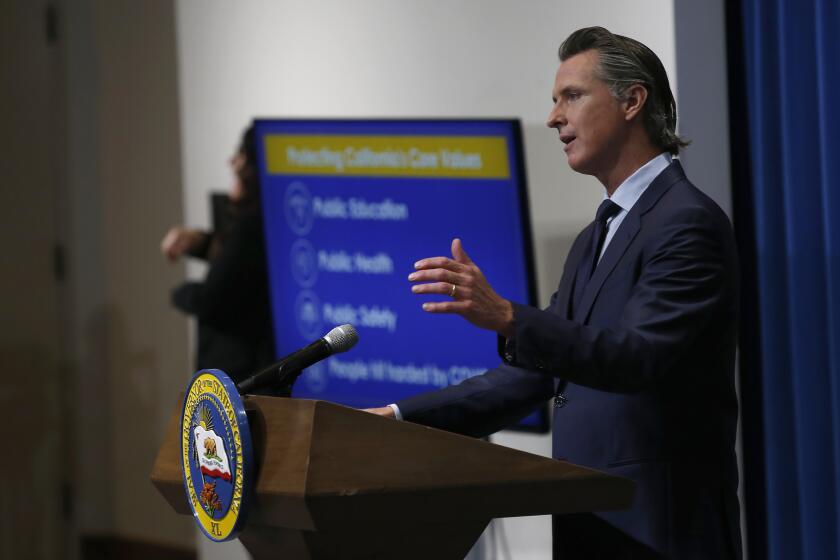California gives too many unchecked tax breaks. It’s time to shine a light on them

- Share via
SACRAMENTO — California’s state government is dishing out $73 billion in tax breaks annually to millions of people and hundreds of interests. But there’s no evidence that this generosity is good or bad for the state.
Does it create jobs? Attract businesses to California? Help companies expand?
You’d think Gov. Gavin Newsom and the Legislature would want to know whether the levy largess has been beneficial for California or just a giveaway.
That’s especially true now as state politicians face a projected $54-billion budget deficit because the economy was straitjacketed to prevent the spread of the coronavirus. Tax receipts are projected to plummet by $41 billion through June 2021.
“We don’t have a clue” about the effectiveness of tax breaks, says state Sen. Hannah-Beth Jackson (D-Santa Barbara). “You can argue about things after you get the facts. But we don’t have the facts. The [breaks] have never been subject to any kind of review.”
Jackson is pushing a bill, SB 956, which would authorize an economic team at UC Berkeley to thoroughly examine certain major tax breaks — credits, exemptions and exclusions. Or “loopholes” if you’re using common language; “tax expenditures” if talking in government-speak.
They’re tagged as “tax expenditures” because they cost the state treasury money it would otherwise collect.
“We’re needing money,” Jackson says. “We’re looking at $10 billion to $18 billion being cut from education. We’ve also got these wildfires. They’re not going away just because there’s a pandemic.”
Newsom vetoed a similar Jackson bill last year, asserting the loophole study would be duplicative. He was wrong.
In a veto message, the governor noted that his Department of Finance already is required to publish an annual report on so-called tax expenditures.
But the department publishes only a laundry list of tax breaks and what they cost the state, not an assessment of whether they’re beneficial or a bust.
Last year’s bill would have required the Legislative Analyst’s Office to conduct the comprehensive study. But the analyst’s office argued it didn’t have the staff or money for the job.
So this year Jackson turned to UC Berkeley, which agreed to do the work for $200,000 — a dirt-cheap price.
1.2 million Californians who are aged, blind or disabled and clinging to government benefits — take a hit in Governor Gavin Newsom’s revised state budget.
“This is the kind of stuff UC does,” Jackson says. “It’s right up their alley. We have one of the finest research institutions in the world offering to do it for a minimum cost.”
UC would send its analyses to a newly created tax review board consisting of the state controller, legislative analyst, state auditor, finance director and head of the Government Operations Agency. The board would then recommend to the Legislature whether the loopholes should be kept as is, closed or expanded.
Jackson says she’s confident Newsom would sign her new bill. She has been negotiating with his staff, and two of his appointees would be on the five-member board.
Last week, the bill cleared its first committee hurdle — Senate Governance and Finance — on a 4-2 party-line vote. Democrats voted “yes,” Republicans “no.”
Jackson counts about 80 tax breaks.
“Many have been on the books for decades without any scrutiny or data to demonstrate they are achieving their public policy goals,” she says.
In truth, most are politically untouchable — thankfully — because they’re widely used deductions or credits involving the state personal income tax.
For example, unlike the federal government, the state doesn’t tax Social Security payments. That’s a $4.3-billion hit this fiscal year.
Another biggie: The home mortgage interest deduction is costing the state $4 billion.
The tax deduction for charitable donations is a $3-billion state loss.
California faces a $9.7-billion drop in tax revenues for the fiscal year that ends in June, with a total projected deficit of $54.3 billion through the early summer of 2021.
Jackson isn’t targeting any of those. She’s singling out eight business tax breaks that don’t have sunsetting clauses and have each cost the state at least $1 billion over 10 years.
One is the “water’s edge” loophole that allows multinational corporations to choose their method of taxation. It’s a $2.4-billion drain on the state treasury.
Another target is the tax credit for research and development — worth $1.8 billion.
“Companies claim doing all this R&D, but what successful company in California can get away with not doing R&D?” asks Lenny Goldberg, consultant to the California Tax Reform Assn., a backer of the bill.
“What happens is companies just throw a bunch of spending into a bucket and call it ‘research and development.’”
But during the committee hearing, Sen. Jim Beall (D-San Jose), who represents Silicon Valley, voiced a strong defense of the R&D tax credit. He asserted it has “benefited California far beyond what we can see through the narrow viewpoint” of lost tax revenue.
Jackson replied: “I suspect that’s exactly what this study will show.”
Another tax break she wants studied is a state sales tax exemption on animals used for human food and on the feed for that livestock. The tax break also covers edible plants and their fertilizers. It’s costing $661 million this year.
Also on her list is the sales tax exemption for farm equipment — $98 million.
“These aren’t tax giveaways. They’re tax investments,” Dennis Albiani of the Family Business Assn. testified, referring to loopholes generally.
This bill has many more opponents than supporters. No one wants their current tax break closely examined.
“If they’re afraid they’ll have their tax credits taken away, maybe they know something we don’t,” Jackson says.
Yes, when private interests try to hide their tax benefits from public scrutiny, it’s a clear sign that a hard look is needed.
More to Read
Sign up for Essential California
The most important California stories and recommendations in your inbox every morning.
You may occasionally receive promotional content from the Los Angeles Times.
















